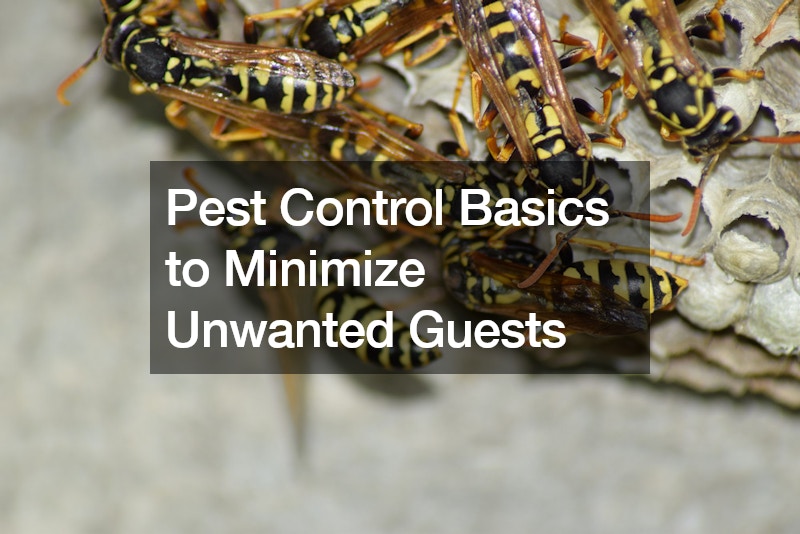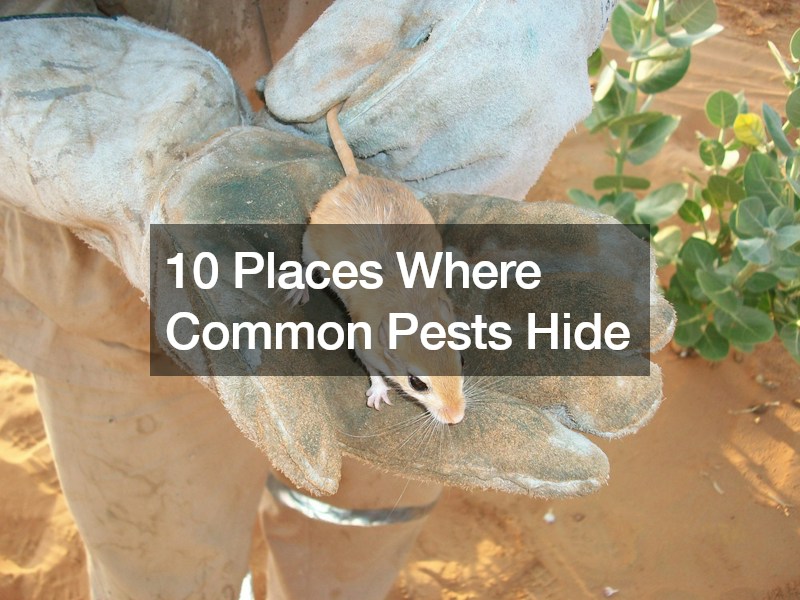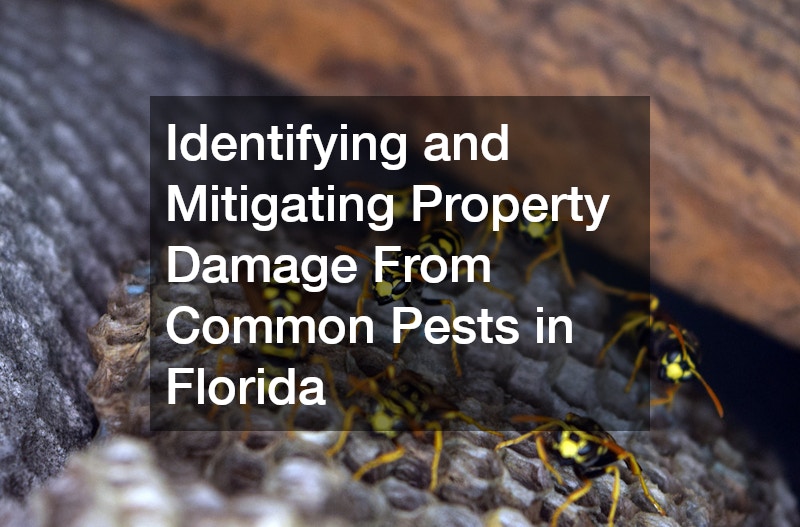Keeping pests at bay is a crucial part of maintaining a safe and healthy home environment. From rodents to insects, unwanted guests can wreak havoc on your property and pose serious health risks to you and your family. By implementing proper prevention methods, such as sealing entry points and maintaining cleanliness, you can greatly reduce the likelihood of a pest infestation. Regular inspections and prompt action at the first sign of pests can help keep your home pest-free. In this comprehensive guide, we will delve into the basics of pest control and provide valuable tips on how to minimize the risk of infestations.
Keep a Stock of DIY Pest Control Options

One of the first steps in pest control is to be prepared with a stock of DIY pest control options. Visiting a farm and ranch store can provide you with a variety of products to help combat common pests such as mice, ants, and spiders. By having these tools on hand, you can address pest issues quickly and effectively.
It’s important to familiarize yourself with the different types of products available and how to use them safely. From traps to baits, there are several options to choose from depending on the type of pest you are dealing with. Regularly checking and replenishing your stock of DIY pest control products can help you stay ahead of infestations.
In addition to chemical solutions, consider using natural remedies such as essential oils or diatomaceous earth to deter pests. These can be effective alternatives for those looking to minimize the use of harsh chemicals in their pest control efforts. Remember to always follow the instructions on the product labels and take necessary precautions when handling any pest control products. It’s also a good idea to research and understand the behavior of the pests you are targeting in order to effectively eliminate them.
Keep Pest Habitats to a Minimum

Another key aspect of pest control basics is to keep pest habitats to a minimum on your property. Contact tree removal companies to address any dead or decaying trees that could attract pests such as termites or carpenter ants. By eliminating these habitats, you can reduce the likelihood of infestations taking hold.
Regularly inspecting your property for potential pest habitats is essential in preventing infestations. Look for areas where pests could hide or breed, such as piles of wood or debris, and take steps to eliminate these attractants. By minimizing pest habitats, you can create a less inviting environment for unwanted guests. Maintaining cleanliness and proper sanitation practices can also deter pests from taking up residence in your property. By implementing these proactive measures, you can significantly reduce the likelihood of infestations occurring.
Working with professional pest control companies can also help you identify and address potential pest habitats on your property. These experts can provide valuable insights and recommendations on how to effectively reduce the risk of infestations.
Remove Overgrowth

Overgrown vegetation can provide ideal hiding spots and breeding grounds for pests, making it essential to remove overgrowth on your property. Consider dumpster rentals to dispose of excess vegetation and debris that could attract pests. By keeping your surroundings clean and tidy, you can minimize the risk of infestations.
Regularly trimming bushes, trees, and shrubs can help prevent pests from finding shelter on your property. Pruning plants and maintaining a well-manicured landscape can make it less appealing for pests to take up residence. Investing in professional landscaping services can help you keep overgrowth in check and reduce the risk of infestations.
In addition to removing overgrowth, it’s essential to address any standing water on your property. Pests such as mosquitoes and rodents are attracted to water sources, so ensuring proper drainage and eliminating any stagnant water can help deter these unwanted guests. Regularly inspecting your property for water leaks and addressing them promptly can also help prevent infestations.
Avoid Water Leaks at All Costs

Water leaks can create ideal conditions for pests to thrive, making it crucial to avoid water leaks at all costs. Contact a drain cleaning business to address any clogged drains or leaking pipes that could attract pests. By fixing these issues promptly, you can prevent pests from finding a water source on your property.
Regularly inspecting your plumbing system for leaks and addressing any issues immediately can help you avoid potential pest infestations. Investing in regular plumbing maintenance can help you keep your pipes in good working condition and reduce the risk of leaks. By staying vigilant and proactive in preventing water leaks, you can minimize the risk of attracting unwanted guests.
In addition to fixing leaks, consider installing moisture barriers in areas prone to water damage. This can help prevent excess moisture buildup and create a less hospitable environment for pests. By taking steps to eliminate water sources and moisture problems, you can significantly reduce the risk of infestations in your home.
Install Quality Defenses Around Your Property
Creating physical barriers around your property can help prevent pests from gaining access to your home. Installing fencing can help keep out larger pests such as raccoons or deer that may pose a threat to your property. By creating a barrier around your yard, you can minimize the risk of pests finding their way indoors.
Choose fencing materials that are durable and difficult for pests to breach. Barbed wire or electric fencing can deter larger pests from entering your property and causing damage. Regularly inspecting your fencing for signs of wear or damage can help you address issues before pests take advantage of weak spots.
In addition to fencing, consider investing in pest-proofing measures for your home. Seal gaps and cracks around doors, windows, and foundation walls to prevent pests from entering your home. Installing screens on windows and vents can also help keep out insects and rodents that may try to sneak indoors. By creating a barrier around your property, you can minimize the risk of pest infestations and protect your home from unwanted guests.
Minimize the Risk of Flooding
Flooding can create ideal conditions for pests to thrive, making it essential to minimize the risk of flooding on your property. Contact grading contractors to address any drainage issues that could lead to standing water. By ensuring proper grading and drainage, you can prevent water from pooling and attracting pests.
Regularly inspecting your property for potential flood risks, such as clogged gutters or low-lying areas, can help you identify and address issues before they lead to flooding. Investing in professional landscaping services can help you design a landscape that promotes proper drainage and reduces the risk of water buildup. By taking steps to minimize the risk of flooding, you can create a less hospitable environment for pests and protect your property from potential damage.
In addition to addressing drainage issues, consider installing flood barriers or pumps to help prevent water from entering your home during heavy rainfall. By having a plan in place to protect your property from flooding, you can minimize the risk of attracting pests that thrive in moist environments. By staying proactive and prepared, you can reduce the likelihood of infestations and keep your home safe from unwanted guests.
Sign Up for Regular Pest Control Services
One of the most effective ways to prevent pest infestations is to sign up for regular pest control services. Professional pest control companies have the knowledge and expertise to identify and address potential pest issues before they become a major problem. By enrolling in a regular pest control program, you can proactively protect your home from unwanted guests.
Regular pest control services typically involve routine inspections and treatments to keep pests at bay. Pest control technicians can identify areas of concern on your property and recommend treatment options to address potential infestations. By working with experts in the field, you can ensure that your home is adequately protected against a wide range of pests.
In addition to regular treatments, pest control companies can provide valuable advice on how to prevent infestations in the future. By following their recommendations and staying proactive in your pest control efforts, you can create a pest-free environment for you and your family. Investing in regular pest control services is a smart way to safeguard your home and minimize the risk of unwanted guests.
Design a Maintainable Landscape
Creating a landscape that is easy to maintain can help prevent pest issues and reduce the risk of infestations. Working with professional landscaping services can help you design a landscape that is both attractive and practical. By choosing low-maintenance plants and materials, you can create a landscape that is less likely to attract pests.
Incorporate native plants into your landscaping to create a habitat that is hospitable to beneficial insects and wildlife. By enhancing biodiversity in your yard, you can create a balanced ecosystem that naturally deters pests. Regularly maintaining your landscape by removing weeds and debris can help prevent pests from finding shelter and food sources on your property.
In addition to design considerations, consider installing barriers such as mulch or gravel to prevent pests from entering your garden beds. Creating physical barriers can help deter pests from damaging your plants and reduce the risk of infestations. By designing a landscape that is easy to maintain and pest-resistant, you can create a beautiful outdoor space that is less prone to pest issues.
Ensure Your Roof and Gutters Stay Clean
Maintaining a clean roof and gutters is essential in preventing pest infestations. Regularly inspecting your roof for signs of damage or wear can help you address issues before pests take advantage of weak spots. Contact gutter maintenance services to clean and repair your gutters to prevent water buildup that can attract pests.
Leaves, debris, and standing water in gutters can create ideal conditions for pests such as mosquitoes and rodents to thrive. By keeping your gutters clean and free of obstructions, you can reduce the risk of infestations and protect your home from water damage. Investing in regular gutter maintenance can help you avoid costly repairs and pest issues down the line.
In addition to cleaning your gutters, consider installing gutter guards to prevent debris from accumulating and clogging the system. Gutter guards can help water flow freely and prevent pests from finding a source of water on your property. By ensuring that your roof and gutters stay clean and well-maintained, you can minimize the risk of attracting unwanted guests to your home.
Get Specialty Assistance From Local Experts
For pests that require specialized treatment, it’s essential to seek assistance from local experts who have experience dealing with these issues. Contact tick removal companies if you are facing a tick infestation on your property. These experts can provide safe and effective treatments to eliminate ticks and prevent future infestations.
Working with professionals who specialize in a particular type of pest can help you address issues quickly and efficiently. Tick removal companies have the knowledge and tools to safely remove ticks from your property and reduce the risk of tick-borne illnesses. By entrusting the removal of pests to experts, you can ensure a thorough and effective solution to your pest problems.
In addition to tick removal companies, consider reaching out to other local experts for assistance with specific pest issues. From bed bug exterminators to wildlife removal services, there are professionals who can help you tackle a wide range of pest problems. By working with local experts, you can get the specialized assistance you need to keep your home pest-free.
Conclusion
In conclusion, implementing pest control basics is essential in minimizing the risk of unwanted guests in your home. By keeping a stock of DIY pest control options, maintaining a tidy landscape, and addressing potential pest habitats, you can create an environment that is less inviting to pests. Avoiding water leaks, installing quality defenses, and signing up for regular pest control services can further protect your home from infestations. By taking proactive steps and seeking assistance from local experts when needed, you can ensure a pest-free environment for you and your family.



